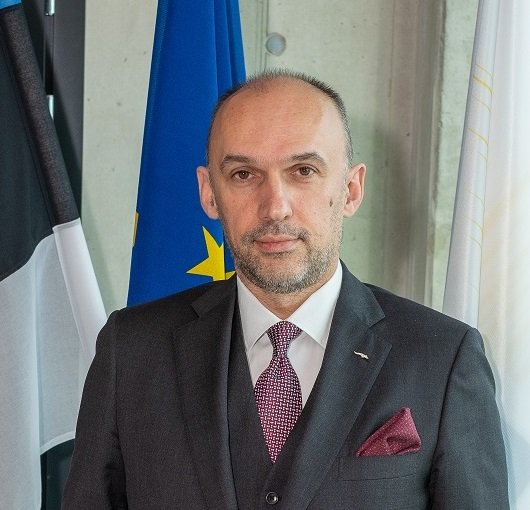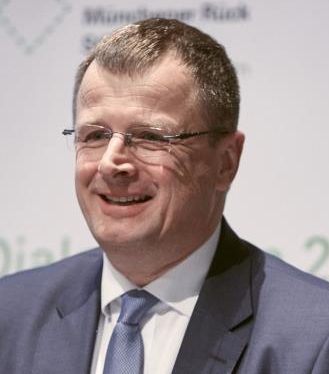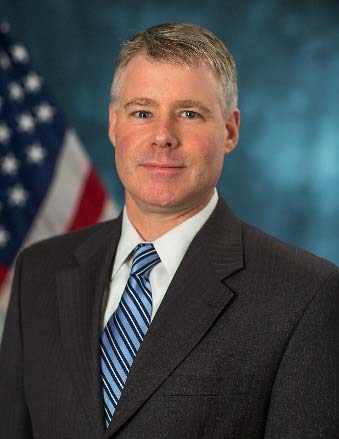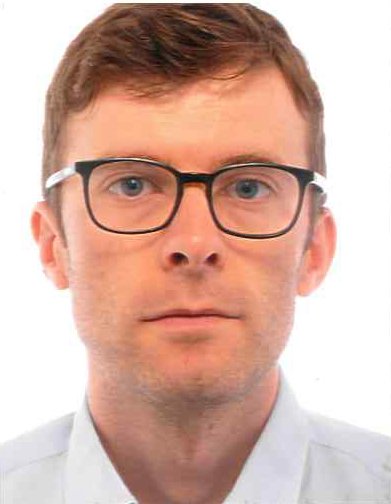Krum Garkov (Executive Director, eu-LISA)

Mr Garkov has more than 20 years of cross-cultural experiences spanning the public and private sectors.
He took up the Executive Director post at eu-LISA in November 2012 and has lead the Agency with the vision to promote information and communication technologies as a key success factor for integrated border management and law enforcement at the EU level. He sees eu-LISA’s mission in helping Members States in their efforts for safer Europe and ensuring the continuous and stable service delivery to them in the ever evolving digital environment.
Before eu-LISA, he was the Operations Director for Experian Group Ltd., a leading global information provider serving the finance industry. Prior to that, Mr Garkov was Program Manager at Hewlett-Packard. He has also served the National Revenue Agency, as well as the Centre for Mass Privatization in Bulgaria. Mr Garkov holds an M. Sc. in Computer Technologies (Varna), an MBA in Information Systems (Stevens Institute of Technology, New Jersey) and has received executive education from London School of Business & Finance with an MBA in Management Consulting.
Ilkka Salmi (Permanent Secretary of the Ministry of the Interior, Finland)

Ilkka Salmi has served as Permanent Secretary of the Ministry of the Interior, which is the ministry for internal security and migration, since 1 July 2018. He is a member of the Committee for EU Affairs, the Arctic Advisory Board dealing with Finland’s Strategy for the Arctic Region, the National Emergency Supply Council and the Council of the Finnish Red Cross. Ilkka Salmi also serves as Chair of the Advisory Board on Gambling and the steering and monitoring group for the Internal Security Strategy, and as Deputy Chair of the Advisory Board for National Defence Education.
He worked as Director of the Finnish Security Intelligence Service in 2007–2011, and before joining the Ministry of the Interior, he served as Director of the EU Intelligence and Situation Centre and at the Directorate-General for Human Resources and Security of the European Commission.
Ilkka Salmi holds a Master of Laws degree and is trained on the bench. He is married and has three sons.
Matthias Oel (Director for Borders, Interoperability and Innovation in DG Migration and Home Affairs, European Commission)

Before assuming this position in May 2017 he was Director for Migration and Security Funds in the same DG from January 2016, Head of Unit for Asylum (as of April 2012) and Special Adviser in the Cabinet of the President of the European Council Herman Van Rompuy (as of January 2010).
Matthias Oel started his career in the German Federal Ministry for Economics and joined the European Commission for the first time in 1995 as Seconded National Expert in the Cabinet of Commissioner Dr. Monika Wulf-Mathies (Regional Policy). In 1997 he moved to the Permanent Representation of Germany to the EU where he worked as Counselor for Industry and Regional Policy during the German EU-Presidency 1999. Afterwards he became a Commission official and worked as Parliament and Council coordinator and Assistant to the Director General for Personnel and Administration. From 2004 to 2006 he was Member of the Cabinet of Vice-President Günter Verheugen mainly covering the Industry Policy dossier.
In 2006 he was seconded to Berlin where he worked as Head of the Task Force “2007 EU-Presidency” and subsequently Director for European Union Affairs in the Federal Ministry of Interior until joining the Cabinet of President Van Rompuy.
Mart Helme (Minister of the Interior of Estonia)

Mart Helme is the Minister of the Interior of the Republic of Estonia since 29 April 2019. He is a member of the Conservative People’s Party of Estonia. From 2015–2019, Mart Helme was a member of the 13th Riigikogu. From 2001–2014, he was a lecturer at the TalTech Institute of International Relations. From 2000–2001, he served as head of the international news’ unit of Eesti Päevaleht. From 1999–2000, he was Undersecretary of Political Affairs and Press of the Ministry of Foreign Affairs. From 1995–1999, he was an Ambassador Extraordinary and Plenipotentiary to Moscow. From 1994–1995, he was head of the 3rd Office of the Ministry of Foreign Affairs. Mart Helme graduated from the University of Tartu in history in 1973. Mart Helme is married and a father of five children.
Nina Gregori (Executive Director of EASO)

Nina Gregori is the Executive Director of the European Asylum Support Office (EASO), based in Malta. She took over her duties on 16 June 2019.
Ms. Gregori previously worked at the Ministry of the Interior of the Republic of Slovenia for over 20 years, occupying the Senior Management post of Director General (or Deputy Director General) for over a decade, responsible for asylum, migration, integration and internal administrative affairs.
She was actively involved in the drafting of Slovenian positions for dossiers on migration, asylum, the Schengen area and visas for the relevant working bodies of the European Union since 1999. During the Slovenian Presidency of the Council of the EU in 2008 she chaired the Strategic Committee on Immigration, Frontiers and Asylum (SCIFA), in which she was also a national delegate until becoming the Executive Director of EASO.
Ms. Gregori has participated in more than 80 Justice and Home Affairs Ministerial meetings as leader (in the absence of the Minister) or as a member of the Slovenian delegation, and has been a member of the Slovenian delegation in meetings of the European Council.
Ms Gregori also served as a national delegate in the Expert Working Group Migration at the OECD and as a member of the Advisory Board of the International Centre for Migration Policy Development (ICMPD).
Long a member of the Slovenian Interdepartmental Commission on Human Rights, she was a permanent member of various delegations of Slovenia in procedures and instruments of the United Nations and the Council of Europe.
Ms. Gregori has been actively involved in the development and work of EASO since its beginning. She was a member of the Agency’s Management Board from 2015 until taking up her duties as the Executive Director.
She has a University degree in Political Science from the University of Ljubljana.
Anssi Kangas (Chief Superintendent, National Police Board, Finland)

Mr Kangas has been working in Finnish National Police Board since 2010, being responsible for EU and international police cooperation with emphasis on information exchange, Europol and Nordic co-operation. He is a member of the national delegation to DAPIX working group, and since 2019 the chairman of the Working Group Corporate Governance at Europol.
Before joining the National Police Board, Mr Kangas served as senior detective superintendent at the National Bureau of Investigation in 2001-2010. During that period, he held the position of the Head of Europol National Unit in 2008-2010, and was the chairman of the Heads on Europol National Units in 2009-2010. Prior to that, Mr Kangas has held various positions in the legal sector.
Mr Kangas holds a Master of Laws degree.
Richard Rinkens (Coordinator for Biometrics and Identity Management, DG HOME, European Commission)

After implementing the Biometric Matching System (BMS) for the Visa Information System (VIS), he worked on a variety of strategic ideas and concepts involving biometrics and identity management such as the Smart Borders initiative, the SIS AFIS, the Schengen Masterlist, EES and ETIAS. He was involved in the Interoperability programme from the start. Richard has an academic background in electronics, informatics and artificial intelligence.
Holger Farnung (Deputy Special Representative of INTERPOL to the European Union)

Holger Farnung is the Deputy Special Representative of INTERPOL to the EU (SRIEU) based in Brussels. He took over his duties on the 01 October 2017. Holger Farnung previously worked at the German Federal Criminal Police (BKA) for over 30 years responsible for organized crime, counter terrorism, training and capacity building.
He led teams investigating the 9/11 and Bali bomb attack.
He was attached from the BKA to the German Ministry of Foreign Affairs as a police liaison officer in Thailand, Italy, Lebanon and the UAE for more than 13 years.
Jesse Seppälä (Co-Chair of the Working Party on Frontiers, Finland’s Presidency of the Council of the European Union)

Mr Jesse Seppälä is currently the Coordinator for the EU matters in the Border Guard Department of the Ministry of the Interior of Finland. As the Co-Chair of the Frontiers WP, he is representing the Finnish Presidency. Additionally, he is Finland’s representative to the Smart Borders Committee, upcoming European Border and Coast Guard Committee and other Commission’s expert groups.
Mr Seppälä has been working 20 years in multiple positions in both operational and administrational management of the Finnish Border Guard. He has served in the Border and Coast Guard Academy, Southeast Finland Border Guard District, Lapland Border Guard District and the Finnish Border Guard Headquarters. Among other positions, he has been the Head of the National Point of Contact to Frontex, the National IBM Coordinator, the National Schengen Coordinator for external borders and a trainer and training developer for Frontex in these matters. He has more than five years of experience of international assignments in border management related missions and projects in third countries for the European Commission, European External Action Service, EU Council and OSCE.
Mr Seppälä holds M.Sc in Economics (Lappeenranta University of Technology, Finland) and a degree of General Staff Officer (National Defence University, Finland).
He has been appointed as a Chief of the ICT Unit of the Finnish Border Guard as from 1.1.2020, looking soon into the implementation of European information systems and the development of the next generation surveillance technologies in Finland.
James E. McLaughlin IV (Executive Director, Targeting and Analysis Systems Program Directorate, US Customs & Border Protection)

Mr. James McLaughlin, IV, currently holds the Senior Executive Service position of Executive Director, Targeting and Analysis Systems, Office of Information and Technology, in Alexandria, Virginia.
In this key role, Mr. McLaughlin is responsible for providing leadership for all aspects of CBP’ s Targeting, Intelligence, and Analysis systems. These global systems support DHS and other Federal agencies in securing the Homeland and ensuring the safe flow of international trade and the traveling public. Prior to this appointment, Mr. McLaughlin served in several key positions within the Targeting and Analysis Systems Program Office and the Office of Information and Technology. He recently
served as the Director of Cargo Targeting, where he established data exchange across the trade community and with foreign governments to help protect our nation’s borders and led numerous CBP initiatives to modernize a wide range of national security systems. His efforts have resulted in the development of systems that secure our borders while expediting the processing of low-risk cargo and travelers. Previously, Mr. McLaughlin served as the Director of Architecture and Engineering for the Targeting Program and as the Branch Chief of Data Center Operations. His career began with legacy U.S. Customs Service in 1997. Mr. McLaughlin is a graduate of Virginia Tech and has a Master’s Certificate in Project Management from George Washington University School of Business and Public Management. He is a recipient of several Commissioner’s awards for government service, including the Diana Dean and Jose Melendez-Perez Anti-Terrorism Award for leading the software development of the Air Cargo Advanced Screening program following the Yemen 2010 Air Cargo bombing attempt, and the Trade and Facilitation Award for the Cargo Release Simplified Entry processing system pilot. Mr. McLaughlin was also recognized for his service with the initial response team that flew to Haiti after an earthquake to build a basecamp and reestablish operations as part of the DHS Operation Safe Return.
Georg Biekötter (Political Administrator, General Secretariat of the Council of the European Union)

Graduated in philosophy, political sciences and journalism at Freie Universität Berlin, Mr Biekötter holds a post of Political Administrator in the General Secretariat of the Council of the EU in Brussels. In the Directorate-General Justice and Home Affairs, Directorate Home Affairs, he is acting as a secretary of DAPIX (Data Protection & Information Exchange) Working Party which is dealing with the implementation of the:
- ‘Prüm Decisions’ (2008/615/JHA and 2008/616/JHA)
- Passenger Name Record (PNR) Directive (EU 2016/681)
- Information Management Strategy (IMS) aiming at supporting, streamlining and facilitating cross-border information exchange in the JHA sector
Patrick Padding (Core Group leader of ENLETS, The National Police of the Netherlands)

Graduated in philosophy, political sciences and journalism at Freie Universität Berlin, Mr Biekötter holds a post of Political Administrator in the General Secretariat of the Council of the EU in Brussels. In the Directorate-General Justice and Home Affairs, Directorate Home Affairs, he is acting as a secretary of DAPIX (Data Protection & Information Exchange) Working Party which is dealing with the implementation of the:
I started my career “on the beat” as a normal policeman, in my hometown Utrecht , the Netherlands, and the work that has to be done “on the beat” is still my motivation and holds my interest. Whatever science or technology will be developed, for me it has to have a relationship with the genuine work. After 19 years on the beat, I gained a new position as Environmental Detective. Environmental crime is not comparable with serious organised crime; mostly there is a fragile line between legal and illegal, whilst profits are enormous. In the period I already focussed on international crimes. Based on the multidisciplinary investigations I had handled I was asked to lead the homicide and serious crime cases on the regional level. A very inspiring and meaningful 6 years period in my life, confronted with deep grieve of victims and families and hunting down the offenders.
After this period, I became the team leader of an innovative Juvenile team in Utrecht, responsible for countering street robberies and other crimes. Here I learned the meaningfulness of social research as we implemented a reduction methodology, which really helped to lower the amount of robberies and to implement prevention in certain parts in the cities.With a lot of experience in my pocket, I applied for the position of team leader of Special Operations of the Central Unit and I became responsible for the covert technical and tactical support in serious crime cases of the Netherlands Police. Special education at the Victorian Police in Australia brought me an outstanding knowledge and in parallel made me responsible for special projects for the Dutch police to develop special equipment in Australia for covert surveillance. In this period, I learned that the EU funding mechanism could be very useful for law enforcement.
In 2012, I was asked to lead ENLETS, the European Network of Law enforcement technology services, which became my full time task. In parallel I have been leading the security advisory Group H2020 for two years which was a very meaningful task.Today, ENLETS holds 29 member states and energised various EU activities such as our H2020 project i-Lead, the ProTect project (public protection), Lion-DC (drugs on the internet) and forthcoming Quick response for Operational Centres (Terrorism-public protection). Next to this, the baseline is to work with the Member States on Technology Interest Groups to build communities and to innovate our work. My mission is to unite law enforcement more in bridging the gap between “working on the beat”, development of tools and methodologies and security research.
Bernd Zenker (Lead Senior Experts – Big Data Analysis, Central Office for Information Technology in the Security Sector (ZITiS))

I currently lead the application development team in the Big Data analysis division at the Central Office for Information Technology in the Security Sector. This agency centralizes and coordinates the research and the development of the law enforcement agencies in Germany in the fields of lawful interception, digital forensics, crypto analysis and Big Data analysis. Before that, I have spent several years in designing and implementing storage systems and platforms for processing massive data. During that time I learned that making systems compliant for hundreds or thousands of analysts is one of the key features that is often ignored in the designing phase and became very challenging at the end of the development process.
Luis de Eusebio Ramos (Deputy Executive Director of Europol, Capabilities Directorate)

Mr de Eusebio was born in 1962 in Madrid, Spain.
In 1988 he graduated with Honours from the Polytechnic University of Madrid as a Telecommunications Engineer. He also holds several masters and certifications in ICT and Public Management.
He has worked in the ICT industry since 1987. His first jobs were in the private sector as an electronic warfare engineer and afterwards as a radio communications systems engineer.
In 1992 he became a Member of the Senior Body of State Civil Administrators and began working for the Spanish Government in the Ministry of Industry.
From 1994 he began what would become a constant theme in his career: the modernisation of administrative processes by means of large ICT projects involving human resources (HR) and financial management. He was appointed to positions in the Ministry of Foreign Affairs (1994), Ministry of Health (1995) and the Telecommunications Market Agency (1999).
Between 2002 and 2006 he was Deputy Director of the Ministry of Public Administration where he was responsible for the overall e-Government strategy of the Spanish Administration and the coordination of all Spanish Ministries. He also contributed to some major ICT projects.
In 2006, Mr de Eusebio was promoted to the position of Chief Information Officer of the Road Traffic National Agency in the Ministry of Interior, working in close cooperation with both the Policía Nacional and the Guardia Civil. He was responsible for streamlining all the services of the Agency and their delivery to millions of citizens.
Mr de Eusebio was appointed Executive Advisor to the General Director of the Spanish National Police in 2012. In this role he was responsible for planning and evaluating the National Police Information and Communications systems as well as for their implementation and evaluation under the ICT part of the National Police Strategic Plan 2013-2016. He also oversaw the participation of the National Police in a number of EU security-related projects.
Mr de Eusebio took up the position of Deputy Director of Europol (now Deputy Executive Director) as Head of the Capabilities Department (now – Directorate) in August 2015, where he directly manages staff from ICT, HR and finance.
Mr de Eusebio speaks Spanish and English; his interests include classical music and photography.
Maria Bouligaraki (Head of Test and Transition Unit, eu-LISA)

Maria Bouligaraki joined eu-LISA in 2012, at the launch of the Agency’s operations and had the opportunity to witness and contribute to the growth and evolution of its vision, mandate and structure within challenging times. She is the Head of the Test and Transition Unit, responsible for ensuring the testing and validation of all new or changed IT systems, components and services, as well as for ensuring their controlled and well-managed transition into operational use. In previous years, she has been leading the Asylum Systems Sector of eu-LISA, responsible for Eurodac, Dublinet and related efforts and initiatives under the European asylum context.
Overall, Maria has over 20-years of IT professional experience and a proven success record in the coordination and delivery of a variety of EU programmes, projects, services and IT transformation initiatives under different policy contexts, financial instruments and EU regulations.
She holds a B.Sc and a M.Sc. in Information Systems and a postgraduate certificate in Cognitive science, with an Artificial Intelligence specialization. She participated in Artificial Intelligence research focusing on knowledge extraction from texts, using machine learning algorithms and natural language processing techniques, already since the late nineties, a period of rather big expectations but lower progress in Artificial Intelligence. Maria is now very enthusiastic to see the quick progress of AI and respond to the challenges ahead! She recently completed her 2nd MSc in European Legal Studies, offered by the European Institute of Public Administration and the University of Lorraine; her thesis focused on the impact of Artificial Intelligence in EU-Law, particularly in the Intellectual Property Law.
Maria is married with 2 kids and hopes to inspire more women to join the IT industry and get management positions the coming years. She is a member of various IT groups and women in tech initiatives.
Zsuzsanna Felkai Janssen (Head of Sector for Migration, DG HOME, European Commission)

Zsuzsanna Felkai Janssen graduated in law in Budapest in the Eötvös Lóránd University in Hungary in 1996. She has a master degree in Commercial and Competition Law from the King’s College London and she has also a master in European Studies in the University of Hamburg.
In 2002, she joined the General Secretariat of the Council of the European Union to assist the accession of Hungary to the European Union as a lawyer linguistic reviser. Since 2011, she has been working at the European Commission in the Directorate General Home Affairs and Migration. She has been in charge of the Schengen Information System, the largest EU law enforcement database, first as a lawyer and afterwards as a Head of Sector. Numerous initiatives have been adopted under her leadership for example in the field of terrorism and biometrics. She has initiated and negotiated the existing legal framework. Since 2018, she is heading a situational awareness sector concerning migration and her team is producing the most important migration situational awareness report of the Commission in migration. In addition to her migration related tasks, she has been appointed to the DG Coordinator for Artificial Intelligence to coordinate and lead the DG AI related initiatives.
Ann‐Charlotte Nygård (Head of Unit, Technical Assistance and Capacity Building, FRA)

Ann-Charlotte Nygård oversees the Agency’s work of making FRA expertise, findings and opinions available to stakeholders through providing real-time practical assistance and support. Her areas of expertise with respect to FRA’s work are asylum, migration, borders and visas. She managed FRA’s multiannual project on EU information technology systems and the use of biometric data in the areas of borders, visas and asylum. She has also worked on fundamental rights aspects in the context of return and rights of migrants in an irregular situation. Before joining the Agency she managed project teams in the areas of capacity-building and research, as well as inter-governmental policy dialogues to strengthen migration governance at the International Centre for Migration Policy Development (ICMPD). She has also worked at the United Nations Centre for Human Settlements (UN-HABITAT) in Nairobi, Kenya and at the United Nations High Commissioner for Refugees (UNHCR). She holds a master’s degree in international relations, with a major in public international law and a specialisation in human rights law.
Theofanis Syrigos (Head of Business Relations Management Sector, eu-LISA)

Mr Syrigos is appointed as Chair of the EES-ETIAS Advisory Group responsible for the coordination of all end-user activities related to the implementation of both Entry Exit and ETIAS systems at European level.
In this capacity, he also chaired and coordinated the activities of the Working Group on ICT Solutions for Member States with External Land and Sea Borders and, together with the European Commission, the Working Group for Carriers, an entity responsible for the coordination of all activities related to the carriers’ compliance with the provisions of the legal base.
Mr Syrigos has more than 20 years’ of experience in the field of large scale IT systems in the area of freedom, security and justice, he served in numerous diplomatic missions of his home country, as well as a National Expert at the European Commission, DG Home Affairs.
Ana Maria Ruginis Andrei (Head of Architecture Sector, eu-LISA)

Mrs Ruginis Andrei joined eu-LISA in 2012 when the Agency was established and since then she was part of the Operations Department focusing her activities mainly on IT infrastructure-related projects and architectural requirements.
Being an active member of the eu-LISA’s Interoperability Team and the lead of the Architecture Team she coordinated several related work streams and architecture studies.
Before joining eu-LISA, Mrs Ruginis Andrei worked as a senior consultant supporting the European Commission (DG TAXUD) in their Customs large scale IT systems management activities.
In her career-heritage she carries a banking management and IT support background experience in addition to a MA in Translation/Interpretation, a Master’s Degree in Banking Management & Marketing and an MSc in Biometrics.
Ott Velsberg (Chief Data Officer, Ministry of Economic Affairs and Communications, Estonia)

Ott Velsberg is the Chief Data Officer for the Estonian government. He oversees data science and data governance in Estonia, including domains like artificial intelligence and open data. He is also a Ph.D. researcher in the department of Informatics at Umeå University and Uppsala University. His research concentrates on the use of information systems in the public sector, with a special focus on the use of the Internet of Things (IoT).
Ave Poom (Senior Policy Officer, eu-LISA)

Ms Ave Poom, Senior Policy Officer, has been working in eu-LISA since January 2013 and has witnessed and supported the development of the Agency since its establishment. She is responsible for stakeholder relations and cooperation with a wide range of partner organisations such as Justice and Home Affairs Agencies, EU Institutions, national administrations and international organisations. She served a Head of Sector between 2015 and 2017. She is contributing to a wide range of matters, including policy and administration, in the Agency and represents eu-LISA at seminars and trainings in Europe.
Before taking up duties at eu-LISA, Ms Poom worked in the European Commission (DG Home Affairs), the General Secretariat of the EU Council (Police and Customs Cooperation Unit) and the Ministry of Interior of the Republic of Estonia (Department of European Affairs).
Ms Poom has studied public administration and political science at the University of Tartu (BA 2001), European politics and administration at the College of Europe (MA 2003) and the London School of Economics (MSc 2006) as well as business administration with a specialisation in management and leadership in the Estonian Business School (MBA 2018).
Dirk Vande Ryse (Director of the Situational Awareness and Monitoring Division, Frontex)

Dirk Vande Ryse is the Director of the Situational Awareness and Monitoring Division at Frontex, which contributes to the provision of reliable and comprehensive situational awareness. In this role he oversees the mobilisation and fusion of a wide range of sources of information and encourages the application of innovative approaches towards the collection of actionable intelligence, with a view of reducing the vulnerability of the external EU borders.
Having started his career at the Belgian Judicial Police, where he specialised in investigating serious crime, he has 30 years of experience in law enforcement intelligence and border security. Prior to joining Frontex, he worked at Europol, the EU Agency for Law Enforcement Cooperation, where he pioneered the creation and maintenance of state-of-the-art information and change management initiatives. During his twelve years at Frontex, Dirk set up and managed the Frontex Situation Centre, as well as the command and control of real-time surveillance and crisis management.
Mr. Vande Ryse holds a bachelor’s degree in social work and a master’s in criminology. Keen on constant learning, he has developed certified qualifications in business administration and change management at master’s level, and was involved in a variety of management and international senior leadership courses. He has also written a number of published scientific articles related to his field of work.
Guido Brockmann (Head of Product Management Sector, eu-LISA)

Guido works as Head of Product Management Sector in eu-LISA. Together with his team he takes care of all products at eu-LISA, the Schengen Visa and Biometric Matching System, the SIS II and its AFIS as well as the Eurodac. Prior to this he was for six years at the boundary between development and production in eu-LISA. As Head of Sector for Test and Integration Services, he led the team responsible for the software quality assurance and integration of new users to the systems.
The nature of his current and past horizontal tasks sees him involved in a multifold of business IT related projects and programs within eu-LISA, ensuring that they are executed to the highest standards. Within his portfolio of competencies he is specialized in applying different methodologies within medium-sized to large mission-critical projects.
Guido holds a M.A. in Political Sciences, Communications Research and International Law from the University Bonn, Germany. Fluent in five languages he is a certified Senior Project Manager with extensive experience in testing and deploying large scale IT systems in the Public Sector.
Prior to joining eu-LISA he worked for the European Research Council EA, the Directorate General for Informatics of the European Commission as well as in private enterprise.

